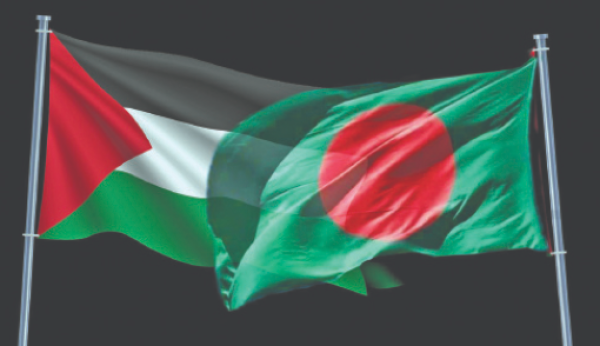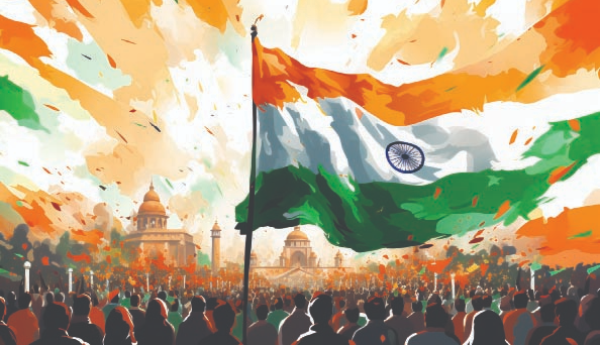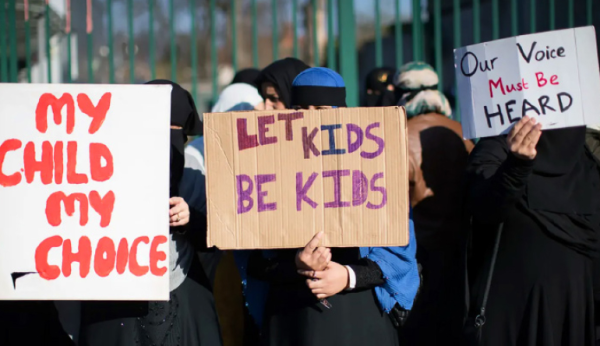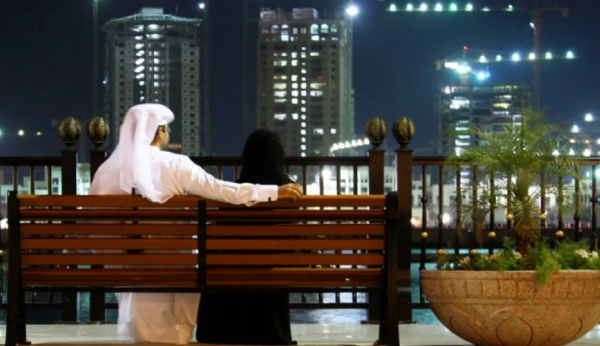(Neo-) Coloniality Eclipses Dhaka’s Palestine Debate Bangladeshis in confusion if supporting Palestine will render them ineligible for democracy
(Neo-) Coloniality Eclipses Dhaka’s Palestine Debate Bangladeshis in confusion if supporting Palestine will render them ineligible for democracy
Soon after Palestinian fighters attacked Israel, Zulkarnaen Saer, a journalist popular with Bangladesh’s pro-democracy forces, posted on his Facebook profile that the Palestinian struggle for freedom may derail the US’ attention from promoting democracy in countries like Bangladesh.

Soon after Palestinian fighters attacked Israel, Zulkarnaen Saer, a journalist popular with Bangladesh’s pro-democracy forces, posted on his Facebook profile that the Palestinian struggle for freedom may derail the US’ attention from promoting democracy in countries like Bangladesh.
Bangladeshi Prime Minister Sheikh Hasina is in power since 2009, making her the longest-reigning premier in the country’s history. She scrapped the neutral election-time government system, established firm control over the judiciary and civil administration, and, with Indian help, survived two controversial elections in 2014 and 2018.
The main opposition alliance, comprising primarily center-left Bangladesh Nationalist Party (BNP) and moderate “Islamist” Jamaat-e-Islami (JI), boycotted the 2014 elections and the 2018 elections, both held under Hasina, were marred with allegations of vote rigging of an industrial scale.
Using the climate of War on Terror and Indian backing, the regime in Dhaka has executed top JI and BNP leaders through the deeply controversial war crimes trials for atrocities allegedly committed by Pro-Pakistanis during the separatist movement in East Pakistan that led to Bangladesh’s creation. BNP chief and three-time Prime Minister Begum Khaleda Zia is also serving time in a politicized case. Her physicians state that she is likely to expire anytime as the regime refuses to let her travel abroad for advanced treatment unavailable in Bangladesh.
The United States has been steadily increasing its support for democratization in Bangladesh since 2021, when it sanctioned senior Rapid Action Battalion (RAB) officials for serious human rights violations. In May this year, the United States has unveiled a new visa policy targeting individuals found involved in undermining Bangladesh’s electoral process and their family members.
The first batch of visa sanctions arrived in early October – with national elections still a few months away – while Hasina was still on US soil to address the UN General Assembly. The general mood in Bangladesh is that the US is targeting the Hasina regime through visa curbs. Meanwhile, the opposition embraced the visa restrictions after indigenous attempts to oust the autocratic regime deemed futile.
Beyond imposing visa restrictions, the US has also noted the Bangladesh Awami League (BAL)’s infringement on political and civil rights of even “Islamist” JI. For their part, Hasina and her allies, especially from India, are arguing that democratization would bring back Islamists in power – a weakening war on terror trope in Western policy circles as the US shifts its focus to the Chinese threat.
One thing that becomes clear from all this is Bangladeshi people have little say over their future. As any hope of democratization hinges on an ironclad US support for it, Bangladeshis speculate the new rules that govern them.
Zulkarnaen Saer may be wrong. The war in Palestine may not impact the functioning of the State Department’s Bangladesh desk. But the issue is, the fear remains – so much so that BNP’s acting chief Tarique Rahman posted an intentionally vague message on X that leaves no room for drawing the American anger.
Irrespective of its veracity, the terror of US abandonment of democratization in Bangladesh runs high among pro-democracy activists. For its part, the regime is sending both types of messages. On the one hand, Bangladesh’s Deputy Minister of Education wrote on X that if the BAL regime in Dhaka were to fall, terrorists like Hamas would rise again. On the other hand, fake quotations attributing to opposition politicians and dissidents that they were siding with Israel, possibly in exchange of US support for democratization, are circulating on Facebook.
The first is directed to the Western audience, the latter for domestic consumption.
Within a neocolonial world order, Bangladeshis fear that their freedom is tied with Palestinians’ annihilation. More pressingly, it begets the question what freedom means if it proscribes them from expressing themselves.
The situation in Bangladesh is not unprecedented. Azerbaijan leverages its ties with Israel to circumvent Armenian lobbying power in Western capitals. Morocco gained US recognition of Western Sahara as its territory in exchange of its normalization of ties with Israel.
Dictators in Muslimistan have placed their partnership with Israel at the center of their regime survival strategy. While MBS’s push for a security deal by recognizing Israel is well-known, Bangladesh’s Hasina’s Israel strategy often evades the scrutiny it deserves.
Dhaka has secretly purchased the notorious Pegasus spyware from Israel to spy on dissident voices. It also removed from the Bangladeshi passport the sentence restricting travel to Israel. What is novel is Bangladeshi oppositions’ desperation to moderate their stance on the Palestinian cause – even JI kept mum about the creation of a Palestinian state – lest it costs them their cherished democracy. Palestine has become the sacrificial lamb feasting on which both the oppressor and the oppressed strive to survive.
Suspending the support for Palestine in hopes of getting crucial foreign aid in a nation’s liberation is a metaphor that underscores the neocolonial reality in which peoples living in Global South find themselves. It explicates the contingencies on which their recognition as humans relies.
Today it is Palestine. Tomorrow it can be something else: religion, gender and sexuality, or who-knows-what. In the neocolonial matrix of power, the West has the ability to think for themselves – it can elect Trump, Boris, and Netanyahu – but the infantilization of the Rest ensures that the latter remain under the careful guidance of the former.
Even if the fear of US backtracking on its promise of delivering democracy to Bangladesh is completely unfounded, the gripping fear among Bangladeshis and their actions based on it mean that the space for democratic debate remains elusive. Be it Palestine or something else, Bangladeshis, like billions in the Global South, are on the run to appease their colonial master: most to secure or retain their right to survive, a few to fortify their reign of terror.
Debating Palestine in Dhaka is an impossibility. Bangladeshis’ position on Palestine, just like the existence of Palestine itself, hinges on American policy – or what Bangladeshis make it to be.
Author : Student, Social and Political Thought, the University of Leeds, UK.
You May Add Comment Now.


Reply
Katharina
child porn You're so cool! I do not think I've truly read a single thing like that before. So good to find another person with a few genuine thoughts on this topic. Really.. thank you for starting this up. This website is something that's needed on the web, someone with some originality!

Reply
 Md Ashraf Aziz Ishrak Fahim
Md Ashraf Aziz Ishrak Fahim 








